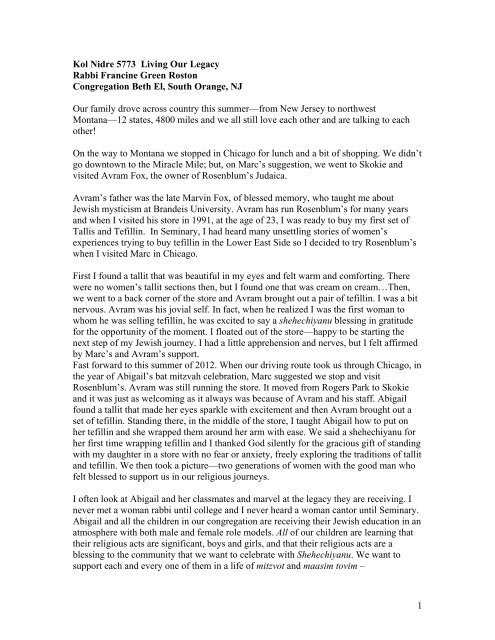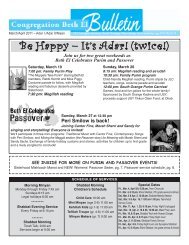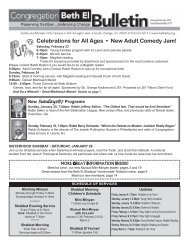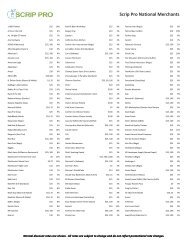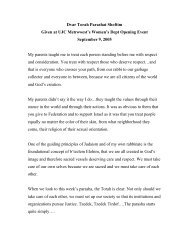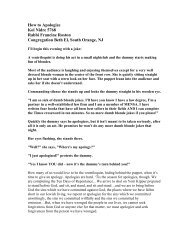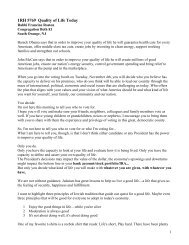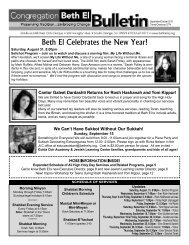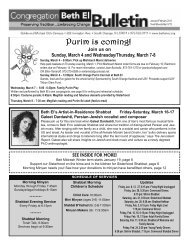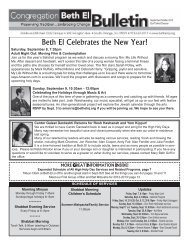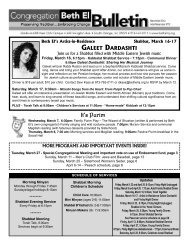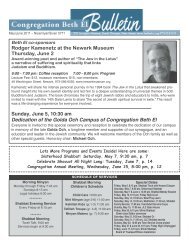Kol Nidre 5773 Sermon - Living Our Legacy - Congregation Beth El
Kol Nidre 5773 Sermon - Living Our Legacy - Congregation Beth El
Kol Nidre 5773 Sermon - Living Our Legacy - Congregation Beth El
You also want an ePaper? Increase the reach of your titles
YUMPU automatically turns print PDFs into web optimized ePapers that Google loves.
<strong>Kol</strong> <strong>Nidre</strong> <strong>5773</strong> <strong>Living</strong> <strong>Our</strong> <strong>Legacy</strong>Rabbi Francine Green Roston<strong>Congregation</strong> <strong>Beth</strong> <strong>El</strong>, South Orange, NJ<strong>Our</strong> family drove across country this summer—from New Jersey to northwestMontana—12 states, 4800 miles and we all still love each other and are talking to eachother!On the way to Montana we stopped in Chicago for lunch and a bit of shopping. We didn’tgo downtown to the Miracle Mile; but, on Marc’s suggestion, we went to Skokie andvisited Avram Fox, the owner of Rosenblum’s Judaica.Avram’s father was the late Marvin Fox, of blessed memory, who taught me aboutJewish mysticism at Brandeis University. Avram has run Rosenblum’s for many yearsand when I visited his store in 1991, at the age of 23, I was ready to buy my first set ofTallis and Tefillin. In Seminary, I had heard many unsettling stories of women’sexperiences trying to buy tefillin in the Lower East Side so I decided to try Rosenblum’swhen I visited Marc in Chicago.First I found a tallit that was beautiful in my eyes and felt warm and comforting. Therewere no women’s tallit sections then, but I found one that was cream on cream…Then,we went to a back corner of the store and Avram brought out a pair of tefillin. I was a bitnervous. Avram was his jovial self. In fact, when he realized I was the first woman towhom he was selling tefillin, he was excited to say a shehechiyanu blessing in gratitudefor the opportunity of the moment. I floated out of the store—happy to be starting thenext step of my Jewish journey. I had a little apprehension and nerves, but I felt affirmedby Marc’s and Avram’s support.Fast forward to this summer of 2012. When our driving route took us through Chicago, inthe year of Abigail’s bat mitzvah celebration, Marc suggested we stop and visitRosenblum’s. Avram was still running the store. It moved from Rogers Park to Skokieand it was just as welcoming as it always was because of Avram and his staff. Abigailfound a tallit that made her eyes sparkle with excitement and then Avram brought out aset of tefillin. Standing there, in the middle of the store, I taught Abigail how to put onher tefillin and she wrapped them around her arm with ease. We said a shehechiyanu forher first time wrapping tefillin and I thanked God silently for the gracious gift of standingwith my daughter in a store with no fear or anxiety, freely exploring the traditions of tallitand tefillin. We then took a picture—two generations of women with the good man whofelt blessed to support us in our religious journeys.I often look at Abigail and her classmates and marvel at the legacy they are receiving. Inever met a woman rabbi until college and I never heard a woman cantor until Seminary.Abigail and all the children in our congregation are receiving their Jewish education in anatmosphere with both male and female role models. All of our children are learning thattheir religious acts are significant, boys and girls, and that their religious acts are ablessing to the community that we want to celebrate with Shehechiyanu. We want tosupport each and every one of them in a life of mitzvot and maasim tovim –1
commandments and good deeds. And, some day one of them may become a rabbi or acantor, some will make aliyah and some will become leaders in service of the Jewishpeople.My prayer for all of our children—really for each and every one of us—is that no oneshould ever question if they can practice Judaism and be a “good Jew”. I wanted to be arabbi because I wanted to show people the beauty of Jewish rituals and a life of mitzvotAND I wanted to make what often looks like an overwhelming, all-encompassing,exclusive religion accessible to anyone who wanted to cast their lot with the Jewishpeople, to create a Jewish family, build a Jewish home and nurture their own Jewishheart, mind and soul. Judaism is our legacy, our inheritance and it is available to eachand every one of us.Yom Kippur is the time in which we all are supposed to consider our legacy. It is the daywe purge ourselves of all our shortcomings before God and we get a “get out of jail free”card, moving straight past Go! into the new year. It is the day when we take the time tostop almost ALL activity of our normal everyday lives—no work, no eating, no drinking,no studying Torah…For the next 24 hours we are to sit in prayer and meditationcontemplating our relationship with God, our relationship with Jewish tradition andJewish community and the legacy we are creating in the way we live our lives.James Kouzes and Barry Pozner in the book A Leader’s <strong>Legacy</strong> teach us this:Legacies aren’t the result of wishful thinking. They’re the result of determineddoing. The legacy you leave is the life you lead. We lead our lives daily. We leaveour legacy daily. The people you see, the decisions you make, the actions youtake—they are what tell your story. It’s the sum of everything you do thatmatters…“The legacy you leave is the life you lead”….So, what characterizes your life?What is it that you want to continue doing in the upcoming year?What is it you want to continue beyond your life? What have you learned that meritspassing on to the next generation?This is the question that confronted and plagued Moses at the end of his journey throughthe wilderness with the children of Israel. And in the final book of the Torah which wewill complete on Simhat Torah, Moses sets out to teach us his legacy and he reminds usthat we must teach it to the next generation.Arnie Eisen, the Chancellor of the Jewish Theological Seminary and a great teacher ofTorah, wrote a book in 1997 called “Taking Hold of Torah.” While Arnie brings hisbackground as a sociologist, he also shares his personal story and vision for the Jewishfuture. The book is divided into five sections relating to the Five Books of the Torah. Thefinal section on Deuteronomy or D’varim is about legacy. Eisen notes that inDeuteronomy Moses shifts from focusing on observance and law to transmission andeducation.2
“We are to translate the words of Torah—devarim—into things, facts on the ground,social realities…which testify to the truth of the covenant rather than against it. However,the book also complicates the work of education immensely by insisting that the good wecan achieve and know through the life of mitzvah is always far from straightforward.Indeed, any hope that we can actually make it to the fulfillment of God’s promise willinevitably be disappointed.”In other words, we are not promised that poverty will disappear, but we are offered a wayto fight against it, the charge to prevent it and lift up those who are fallen. The legacy ofthe Jewish people is not that we will create a perfect world, but that we will live in animperfect world and will always have a choice to use Torah teachings to improve ourworld and our selves.[“The possibility of achieving [God’s promise] has been provided and guaranteed: thepath of mitzvah is meant for human beings, rather than angels, to walk. It is not inheaven, Moses declares, not across the sea, but close by, in the heart, to do…The textwants neither blindness to the fact of immense obstacles nor the paralysis sometimesinduced by the presence of those obstacles.”]The legacy of Torah is the power to do good, the capacity to live a good life, to make apositive impact in the world. And what motivates in this work is LOVE. Often we are notas comfortable as our neighbors with the premise that “God is love” and yet, we can ALLknow love through our faith, our liturgy and our religion. Ahavat olam, ahavah rabbah,ve-ahavta….listen for “ahavah” and you will find it throughout our prayerbook.Love God, with all your heart, all your soul and all your might.And these words, which I command you this day, you shall take them to heart and teachthem diligently to your children….We are commanded to love God and without pause we are then commanded to transmitGod’s love and God’s teaching to our children. Children, here, can be defined as the nextgeneration—the children we raise or the children with whom we interact in the world.Eisen relates that he never truly understood the power of divine love to compel us toJewish living until he himself was a parent:“Love is the means as well as the end of parenting, the key to making the world a place inwhich life is chosen and good an activity so palpably worthwhile that it puts to rest allquestions of its value…Love reframes the questions of value, success, and results. Itovercomes the gap between expectations and outcomes, enabling one to ‘choose life’without reservation. We do not ask, regarding love of children, ‘what for? What goodwill it do?’ The experience of love has the ability to convince us—in a way which eventhe words of the Torah cannot—of its own self-sufficient correctness.”3
In a previous sermon in which I tried to convey the pull of mitzvot and this convincing,compelling force that draws us in without question, I used the illustration of riding awave on the Atlantic Ocean. When you hit the perfect wave, you are swept away, anyfear can be overpowered by joy, flight, the feeling of being carried on an awesomejourney. The love of children that can be more overwhelming than we might ever haveexpected is a similar force. How can you say no to it? You want more! If life is all aboutthis, you are in.As we all know, life is not all about love and awe. Life is lived in every moment andJewish life is lived one mitzvah to the next.The mitzvot help us show love and help usexperience love in those imperfect, painful moments called “real life”.Moses legacy is a life well-lived, according to Jewish law and inspired by God’s love.<strong>Our</strong> actions are what teach others about the Jewish people and our actions are what teachthe next generation about good and right living. “Every action or omission conveys somemessage that our children receive, and that is all the more true of minute interactions withthem, multiplied by the tens of thousands every year. We either teach Torah or somethingelse at every moment, ‘when we lie down and when we rise up.’ If we do not teach Torahenough of the time, the opposite of Torah will prevail in the world…”Moses’ legacy is Torah/education, living mitzvot, and choosing life and good. Allinspired by love.What is your legacy?How do you treat people that you encounter in the world? People you love? And peoplefor whom you work? People who work for you? People who are strangers on the street?How do you decide how to spend your limited funds? How do you help others who are inneed? How do you support your community and insure that the legacy of Jewish traditionand Jewish community continues into the next generation?I don’t want to tell you how you must answer these questions. We each have to figure itout for ourselves in the upcoming days and weeks and months and year. My prayer for allof us is that our legacy is created and lived out guided by the core principle of Jewish life:Love, Love God, Love your neighbor as Yourself, Love life …In last week’s NYTimesmagazine, Neil Young related to David Carr that his life today is defined by the battle tobe a person good enough to be worthy of his family’s love.If you are making your life’s decisions based on love and the desire to bring more loveand Jewish values into the world, you will be leading a good life and creating a lastinglegacy.May we all be written and sealed in the book of Life and write our own books filled withjoy, meaning and Torah.4


